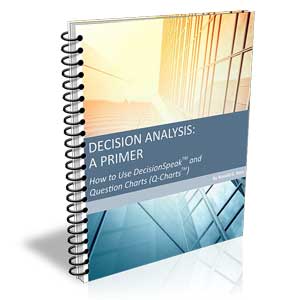Relearning the Basics of Communicating ~ Business Semantics and Business Rules
Business semantics addresses one of the biggest problems in companies today -- simple communication. Communication at the business level takes place in natural language -- words and sentences -- not IT constructs, even if invented by IT people with an eye toward modeling the business.
For example, people don't naturally talk in terms of 'business entities' or 'business objects.' In the real world, people are far more likely to say things like, "When you say 'customer,' what do you mean?" Until they agree about what the concept means (i.e., form a clear definition), any further communication or specification is likely to be off-target.
The most obvious form of business semantics from the perspective of business people is a glossary or more accurately, a business vocabulary. Such a vocabulary is not 'information.' Suppose a customer walks into a bank and wants to open an account. There is no 'information' (or data or data processing) until there is communication. By communication, I don't mean just the actual words exchanged -- that's just the tip of the iceberg. First, the customer and the bank must share the same fundamental understanding of the concept account. This involves significant unspoken communication (but undoubtedly written down somewhere) about the rules regarding accounts. It also involves an acknowledgement (in writing, of course) that these rules are mutually understood and amenable to both parties. That's what business semantics are about.
IT professionals have traditionally taken the considerable task of building shared business concepts and the sets of business rules associated with them as more or less a given. That was work for the business side. Real men (and women) code applications.
We are well past the point where that attitude is viable. IT applications today are pervasive, and there is no escaping the force fields they project. The original direction of knowledge flow -- business ideas into IT applications -- is now largely just the reverse. Stove-pipe applications have produced stove-pipe business constructs -- islands of differing business languages. The incongruencies between these languages frustrate inter-group communication and effective corporate governance at almost every turn.
Solving the problem from a business perspective is as 'simple' as developing a well-formed business vocabulary. Of course, the problem is not that simple from the 'people' point of view. Learning to speak a different language requires patience and not a small measure of willingness and talent.
Nor is it simple from a formal point of view. The business vocabulary must be so well organized that it can support not only comprehensive expression of business rules, but also permit software tools to 'understand' them. That way the business rules can be examined mechanistically for conflicts and completeness, and applied automatically in all manner of white-collar work.
Not simple, but certainly not impossible either. The tools are coming. And for many organizations, it won't be a minute too soon.
# # #
About our Contributor:
Online Interactive Training Series
In response to a great many requests, Business Rule Solutions now offers at-a-distance learning options. No travel, no backlogs, no hassles. Same great instructors, but with schedules, content and pricing designed to meet the special needs of busy professionals.










How to Define Business Terms in Plain English: A Primer
How to Use DecisionSpeak™ and Question Charts (Q-Charts™)
Decision Tables - A Primer: How to Use TableSpeak™
Tabulation of Lists in RuleSpeak®: A Primer - Using "The Following" Clause
Business Agility Manifesto
Business Rules Manifesto
Business Motivation Model
Decision Vocabulary
[Download]
[Download]
Semantics of Business Vocabulary and Business Rules